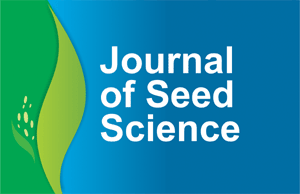Abstract:
The release of soybean varieties resistant to dicamba herbicide leads to the possibility of dicamba herbicide drift into soybean seed production fields and reduction in the physiological quality of soybean seeds. The aim of this study was to evaluate the physiological quality of soybean seeds as a function of the application of reduced rates of dicamba in two phenological phases. A randomized block experimental design was used, with four replications. The 4 × 2 + 1 factorial arrangement consisted of four reduced rates (0.028, 0.28, 2.8 and 28 g.ha-1) of dicamba applied in the V4 and R2 stages + a control. The physiological quality of the seeds was evaluated after harvest and at six months after storage at 20 °C. At the rate of 28 g.ha-1 of dicamba applied in the V4 and R2 stages, seed germination declined by 15% and 42%, respectively. After storage, seeds under the 28 g.ha-1 dicamba treatment had 64% lower germination compared to the lowest application rate evaluated, and electrical conductivity doubled in relation to the control. The physiological quality of soybean seeds declines under these reduced rates of dicamba applied in the V4 and R2 stages, both before and after storage.
Index terms:
application times; germination; Glycine max; reduced application rates; storage
